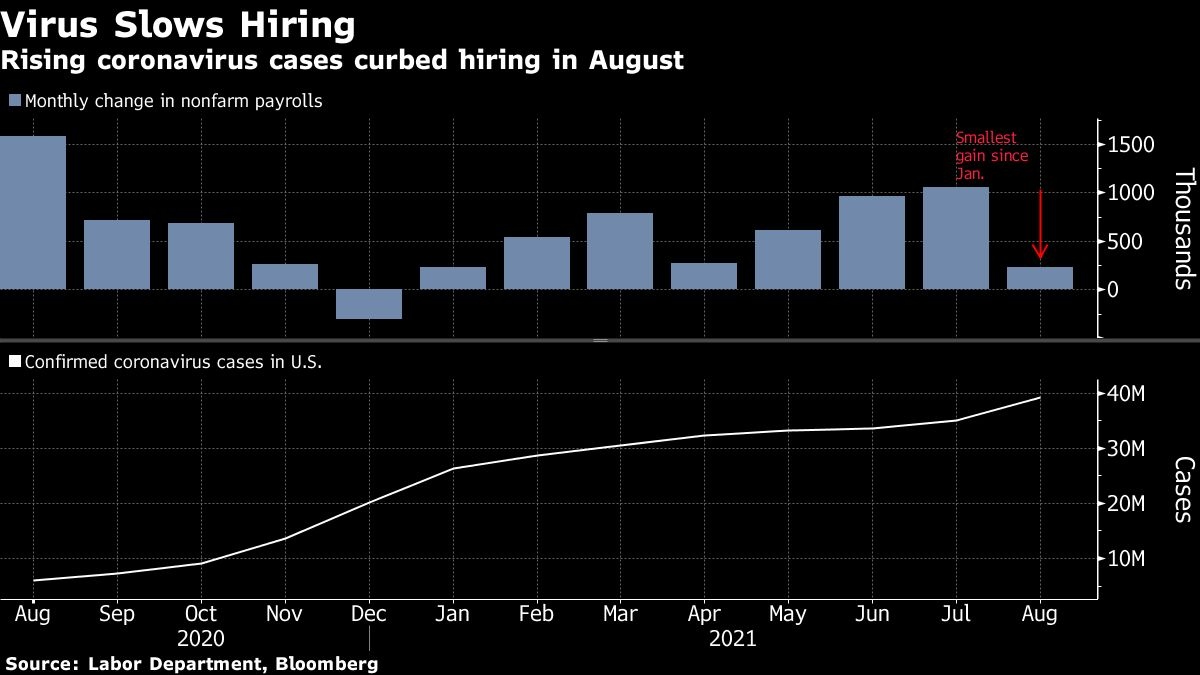Sep 10, 2021
U.S. Fed seen on track for 2021 taper start even as COVID-19 swirls
, Bloomberg News
Fed to Announce Tapering in December, TD Securities Says
The U.S. Federal Reserve is unlikely announce a start-date to scaling back asset purchases at its meeting this month, but is still on track to begin in 2021.
Public comments by Fed officials before the central bank begins its pre-meeting blackout showed them unswayed by concerns over the delta variant, which slowed the pace of hiring last month, and hewing closely to Chair Jerome Powell’s Aug. 27 message that tapering could start later this year. The quiet period on public Fed comment begins midnight Friday in Washington.
“I don’t think the August employment report has changed my view,” Cleveland Fed President Loretta Mester told reporters Friday. “I’d be very comfortable with us starting this year and winding down the purchases over the first half of next year.” New York Fed President John Williams and Governor Michelle Bowman also said that scaling back buying could be appropriate this year.
The Federal Open Market Committee will gather Sept. 21-22 and could signal tapering at its meeting in early November, while retaining flexibility to delay until December if the economy doesn’t perform as well as expected.

“The right base case is still that the Fed makes the taper decision in November,” Evercore ISI head of central bank strategy Krishna Guha wrote in a note to clients. He expects language from the Fed meeting “that leans November for tapering but does not lock November” because a weak employment report for September could nudge them to delay until December.
The resurgence of coronavirus cases and hospitalizations in the U.S. has damped some economic activity, including hiring. The slowdown has prompted some of the Fed’s proponents of an earlier taper to either revise their calls or say they are carefully observing what’s happening in the economy before making a final decision.
“I’ll be watching carefully how the economy is unfolding between now and our Sept. 22 meeting,” Dallas Fed President Robert Kaplan said Wednesday in a virtual event. “I don’t see a fundamental change to the outlook; if I get to the meeting and continue to feel that way, I’d be advocating that we should announce a plan for adjusting these purchases in the September meeting and begin shortly thereafter, maybe in October.”
NO HURRY
While Kaplan is one of the more hawkish FOMC members when it comes to scaling back the central bank’s US$120 billion per month in bond purchases, some colleagues who were in that camp are no longer pushing so hard.
Atlanta Fed President Raphael Bostic, who just a few weeks ago said that the economy was “very close” to meeting the central bank’s conditions to start tapering, told Dow Jones this week he doesn’t expect the decision to come at the September meeting.
Increased virus cases and weaker economic data indicate that more time is needed before the Fed can make a final decision on reducing stimulus, Bostic said, though he still saw tapering beginning this year.
While the recent flare up in coronavirus cases has hampered some parts of the economy, many Fed officials have argued that it won’t actually lead to a contraction as businesses and people have become more adept at living through these surges.
Not everyone is convinced the Fed will taper in 2021.
“Tapering is off the table this month and whether the Fed will make an announcement before year-end depends on the strength of employment, which is being held back by increasingly acute labor shortages and the spread of the delta variant,” Paul Ashworth, chief North America economist at Capital Economics, wrote in a note.

